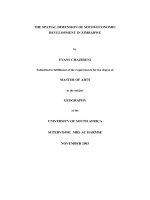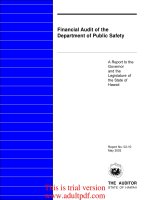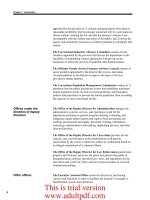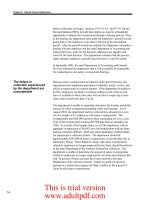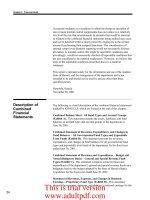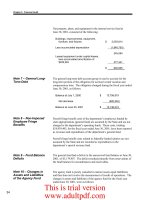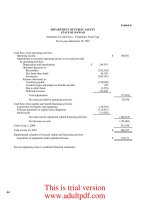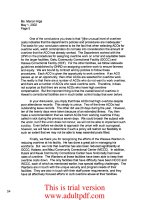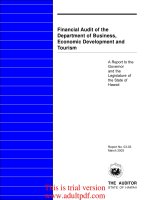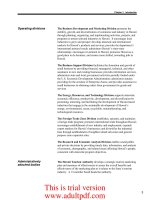Financial Audit of the Department of Business, Economic Development and Tourism_part1 docx
Bạn đang xem bản rút gọn của tài liệu. Xem và tải ngay bản đầy đủ của tài liệu tại đây (205.52 KB, 10 trang )
Financial Audit of the
Department of Business,
Economic Development and
Tourism
A Report to the
Governor
and the
Legislature of
the State of
Hawaii
THE AUDITOR
STATE OF HAWAII
Report No. 03-03
March 2003
This is trial version
www.adultpdf.com
Office of the Auditor
The missions of the Office of the Auditor are assigned by the Hawaii State Constitution
(Article VII, Section 10). The primary mission is to conduct post audits of the transactions,
accounts, programs, and performance of public agencies. A supplemental mission is to
conduct such other investigations and prepare such additional reports as may be directed by
the Legislature.
Under its assigned missions, the office conducts the following types of examinations:
1. Financial audits attest to the fairness of the financial statements of agencies. They
examine the adequacy of the financial records and accounting and internal controls, and
they determine the legality and propriety of expenditures.
2. Management audits, which are also referred to as performance audits, examine the
effectiveness of programs or the efficiency of agencies or both. These audits are also
called program audits, when they focus on whether programs are attaining the objectives
and results expected of them, and operations audits, when they examine how well
agencies are organized and managed and how efficiently they acquire and utilize
resources.
3. Sunset evaluations evaluate new professional and occupational licensing programs to
determine whether the programs should be terminated, continued, or modified. These
evaluations are conducted in accordance with criteria established by statute.
4. Sunrise analyses are similar to sunset evaluations, but they apply to proposed rather than
existing regulatory programs. Before a new professional and occupational licensing
program can be enacted, the statutes require that the measure be analyzed by the Office
of the Auditor as to its probable effects.
5. Health insurance analyses examine bills that propose to mandate certain health
insurance benefits. Such bills cannot be enacted unless they are referred to the Office of
the Auditor for an assessment of the social and financial impact of the proposed
measure.
6. Analyses of proposed special funds and existing trust and revolving funds determine if
proposals to establish these funds are existing funds meet legislative criteria.
7. Procurement compliance audits and other procurement-related monitoring assist the
Legislature in overseeing government procurement practices.
8. Fiscal accountability reports analyze expenditures by the state Department of Education
in various areas.
9. Special studies respond to requests from both houses of the Legislature. The studies
usually address specific problems for which the Legislature is seeking solutions.
Hawaii’s laws provide the Auditor with broad powers to examine all books, records, files,
papers, and documents and all financial affairs of every agency. The Auditor also has the
authority to summon persons to produce records and to question persons under oath.
However, the Office of the Auditor exercises no control function, and its authority is limited to
reviewing, evaluating, and reporting on its findings and recommendations to the Legislature and
the Governor.
THE AUDITOR
STATE OF HAWAII
Kekuanao‘a Building
465 S. King Street, Room 500
Honolulu, Hawaii 96813
This is trial version
www.adultpdf.com
The Auditor State of Hawaii
OVERVIEW
Financial Audit of the Department of Business, Economic
Development and Tourism
Report No. 03-03, March 2003
Summary
The Office of the Auditor and the certified public accounting firm of KPMG LLP conducted
a financial audit of the Department of Business, Economic Development and Tourism,
State of Hawaii, for the fiscal year July 1, 2001 to June 30, 2002. The audit examined the
financial records and transactions of the department; reviewed the related systems of
accounting and internal controls; and tested transactions, systems, and procedures for
compliance with laws and regulations.
We found deficiencies in the financial accounting and internal control practices of the
department. We found that the department is deficient in the management of its loan
programs. The department administers four revolving loan programs that were developed
to stimulate Hawaii’s economy and be responsive and beneficial to small businesses unable
to obtain financing through the private sector.
However, we found that the department issued only 16 loans totaling $2,333,500 during the
five-year period ended June 30, 2002. In addition, of the 94 outstanding loans with an
aggregate principal balance of $9,449,566, 45 loans (48 percent) with an aggregate
principal balance of $5,568,059 (59 percent) were greater than 90 days past due.
Although the department has policies and procedures in place to administer its various loan
programs, these policies and procedures are neither formally documented nor consistently
enforced. The department does not actively monitor its delinquent loans or its delinquent
participation loans.
We found that the department’s loan files are incomplete. Loan files selected for review
were missing adequate documentation of on-site inspections of applicants’ collateral or
evidence that loan proceeds were spent for authorized purposes. The department is not
consistently using the informal checklist that it developed to assist in assuring that all
necessary documents are obtained and maintained in the loan files.
We also found that 12 loan repayment checks out of a sample of 15 (80 percent), were not
deposited by the department in a timely manner. The checks totaled $226,171 and averaged
six elapsed business days between their receipt and deposit.
The Hawaii Tourism Authority does not adequately manage its contracts. We found that
contractors performed services prior to the execution of legally binding contracts; contracts
were renewed prior to the authority’s evaluation of the quality of the work provided; and,
in one instance, final payment was remitted to the contractor prior to completion of all
required tasks.
We found that the department does not properly lapse unnecessary encumbrances. Our
testing found 11 instances, out of a sample of 30, where funds remained encumbered for
contracts or purchase orders that were canceled, inactive, and/or expired. Of the 11
instances, eight encumbrances totaling $517,430 should have been voided at least two
fiscal years ago, with one encumbrance that should have been voided in 1994. The
department’s failure to identify and lapse invalid encumbrances has denied the State its
opportunity to utilize these funds for other priorities.
This is trial version
www.adultpdf.com
Report No. 03-03 March 2003
Marion M. Higa Office of the Auditor
State Auditor 465 South King Street, Room 500
State of Hawaii Honolulu, Hawaii 96813
(808) 587-0800
FAX (808) 587-0830
The department must improve the administration of its petty cash funds. Petty cash
functions are inadequately segregated; the petty cash custodian performs both custodial and
reconciliatory functions. Also, the department’s various divisions do not submit account
reconciliations to the fiscal office in a timely and consistent manner. We found that seven
out of a sample of 15 petty cash replenishment requests were not accompanied by
reconciliations as required by department policy.
Finally, the balance of $25,000 maintained in the department’s administration petty cash
fund is excessive. The average monthly disbursement out of the account during FY2001-02
was $356, and $776 was the largest monthly disbursement. Once again, the State is denied
the opportunity to utilize the funds for other priorities.
We recommend that the department increase participation in its loan programs and
implement a formal marketing strategy. Also, the department should revise its procedures
for monitoring delinquent accounts and contact borrowers as soon as their accounts become
ten days past due.
We also recommend that the department establish written guidelines for loan functions,
properly maintain loan files and ensure that the files contain all required documentation,
and deposit loan repayments on the day of receipt.
The Hawaii Tourism Authority should execute formal contracts before contractors perform
services, monitor contracts and relevant agreement terms in a complete and timely manner,
ensure receipt of final reports from contractors by the stipulated completion date, withhold
final payments from contractors until final reports are received and approved, and perform
final evaluations of each contractor prior to entering into any subsequent agreements with
them.
In addition, we recommend that the department unencumber funds relating to contracts/
purchase orders that are fulfilled during the year; ensure that all encumbrances correspond
to active and ongoing projects or purposes; and promptly unencumber existing encumbrances
related to closed, terminated, and/or completed projects or purposes.
Finally, the department should assess the segregation of duties related to the department’s
various petty cash funds, perform periodic and unannounced reviews of each division’s
petty cash account reconciliations and cash counts, require divisions to prepare and submit
reconciliations of petty cash accounts in adherence to established policies, and significantly
reduce the amount of funds in the administration petty cash fund.
The department agrees with some of our findings and recommendations and noted that it
has already begun to implement some of our recommendations.
The Hawaii Tourism Authority, although not in complete agreement with our findings,
stated that it will insist upon strict compliance with its technical contract management
requirements by it contractors.
Recommendations
and Response
This is trial version
www.adultpdf.com
Financial Audit of the
Department of Business,
Economic Development and
Tourism
Report No. 03-03
March 2003
A Report to the
Governor
and the
Legislature of
the State of
Hawaii
Conducted by
The Auditor
State of Hawaii
and
KPMG LLP
THE AUDITOR
STATE OF HAWAII
Submitted by
This is trial version
www.adultpdf.com
Foreword
This is a report of the financial audit of the Department of Business,
Economic Development and Tourism, State of Hawaii, for the fiscal year
July 1, 2001 to June 30, 2002. The audit was conducted pursuant to
Section 23-4, Hawaii Revised Statutes, which requires the State Auditor
to conduct postaudits of all departments, offices, and agencies of the
State and its political subdivisions. The audit was conducted by the
Office of the Auditor and the certified public accounting firm of KPMG
LLP.
We wish to express our appreciation for the cooperation and assistance
extended by officials and staff of the Department of Business, Economic
Development and Tourism.
Marion M. Higa
State Auditor
This is trial version
www.adultpdf.com
v
Table of Contents
Chapter 1 Introduction
Background 1
Organization 1
Objectives of the Audit 5
Scope and Methodology 5
Chapter 2 Internal Control Deficiencies
Summary of Findings 7
The Department’s Management of Its Loan Programs
Is Ineffective 8
Recommendations 12
The Hawaii Tourism Authority Does Not Adequately
Manage Its Contracts 13
Recommendations 14
The Department’s Failure to Lapse Unnecessary
Encumbrances Has Deprived the State of the Use
of Funds for Other Priorities 15
Recommendations 16
The Department’s Administration of Petty Cash Funds
Must Be Improved 17
Recommendations 18
Chapter 3 Financial Audit
Summary of Findings 19
Independent Auditors’ Report 19
Report on Compliance and on Internal Control Over
Financial Reporting Based on an Audit of Financial
Statements Performed in Accordance with
Government Auditing Standards 21
Description of Basic Financial Statements 23
Notes to Basic Financial Statements 24
Response of the Affected Agency 49
This is trial version
www.adultpdf.com
vi
List of Exhibits
Exhibit 1.1 Organizational Structure of the Department of
Business, Economic Development and Tourism 2
Exhibit 3.1 Statement of Net Assets, June 30, 2002 42
Exhibit 3.2 Statement of Activities, Year Ended June 30, 2002 43
Exhibit 3.3 Balance Sheet - Governmental Funds,
June 30, 2002 44
Exhibit 3.4 Statement of Revenues, Expenditures, and Changes
in Fund Balances - Governmental Funds, Year
Ended June 30, 2002 45
Exhibit 3.5 Statement of Fiduciary Net Assets, Fiduciary Fund,
June 30, 2002 46
Exhibit 3.6 Statement of Revenues and Expenditures - Budget
and Actual (Budgetary Basis) - General and
Economic Development Special Revenue Funds,
Year Ended June 30, 2002 47
This is trial version
www.adultpdf.com
1
Chapter 1: Introduction
Chapter 1
Introduction
This is a report of our financial audit of the Department of Business,
Economic Development and Tourism, State of Hawaii (department).
The audit was conducted by the Office of the Auditor and the
independent certified public accounting firm of KPMG LLP. The audit
was conducted pursuant to Section 23-4, Hawaii Revised Statutes (HRS),
which requires the State Auditor to conduct postaudits of the
transactions, accounts, programs, and performance of all departments,
offices, and agencies of the State of Hawaii (State) and its political
subdivisions.
Section 26-18, HRS, describes the department’s responsibilities. It states
that “The department shall undertake statewide business and economic
development activities, undertake energy development and management,
provide economic research and analysis, plan for the use of Hawaii’s
ocean resources, and encourage the development and promotion of
industry and international commerce through programs established by
law.”
The director plans, organizes, directs, coordinates, and reports on the
various activities of the department. The director is supported by three
offices, five divisions, and 12 administratively attached bodies.
Exhibit 1.1 displays the department’s organizational structure. The
primary responsibilities of these units follow.
The Administrative Services Office provides general internal
management, fiscal, budgetary, contractual, and personnel services in
support of departmental programs and activities; it also provides advice
and assistance to the director and staff in administrative matters.
The Communications and Publications Office serves as the central
communications, publishing, marketing, and public relations arm of the
department for the widespread dissemination of information on business,
investment, and economic opportunities and conditions in the State.
The Hawaii Tourism Office has been inactive since July 1, 1998 and
was abolished by the Legislature on July 1, 2002.
Background
Organization
Staff offices
This is trial version
www.adultpdf.com
2
Chapter 1: Introduction
BUSINESS
DEVELOPMENT &
MARKETING
DIVISION
ENERGY,
RESOURCES, &
TECHNOLOGY
DIVISION
BUSINESS
SUPPORT DIVISION
FOREIGN-TRADE
ZONE DIVISION
RESEARCH &
ECONOMIC
ANALYSIS DIVISION
OFFICE OF THE DIRECTOR
HAWAII TOURISM AUTHORITY
ALOHA TOWER DEVELOPMENT
CORPORATION
BARBERS POINT NAVAL AIR STATION
REDEVELOPMENT COMMISSION
HAWAII STRATEGIC DEVELOPMENT
CORPORATION
HAWAII TELEVISION AND FILM
DEVELOPMENT BOARD
HIGH TECHNOLOGY DEVELOPMENT
CORPORATION
LAND USE COMMISSION
OFFICE OF PLANNING
SMALL BUSINESS REGULATORY REVIEW
BOARD
HAWAII COMMUNITY DEVELOPMENT
AUTHORITY
NATURAL ENERGY LABORATORY OF
HAWAII AUTHORITY
HOUSING & COMMUNITY DEVELOPMENT
CORPORATION OF HAWAII
ADMINISTRATIVE SERVICES OFFICE
COMMUNICATIONS & PUBLICATIONS
OFFICE
HAWAII TOURISM OFFICE
(For administrative
purposes)
Exhibit 1.1
Organizational Structure of the Department of Business, Economic Development and
Tourism
Source: Department of Business, Economic Development and Tourism.
This is trial version
www.adultpdf.com
